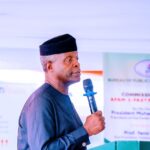Stakeholders in the education sector have emphasised the need for tertiary institutions in Africa to implement requisite skills students need in their workplace to bridge the skills gap between what universities teach and what industries demand.
The stakeholders who spoke at the Going Global Africa 2024, organised by the British Council brought together policymakers, tertiary education leaders, and industry experts who deliberated on the future of higher education.
Speaking at a press conference in Abuja, the Acting Country Director of the British Council, Chilufya Besa, said the event aimed to create a system that answers the needs of young people, who make up 70 per cent of Africa’s population.
Besa called for a collaborative efforts with the Federal Ministry of Education and other key stakeholders in the sector to improve quote education in Nigeria.
He, however, countered the idea that Africa’s education sector is experiencing setbacks, pointing to evidence-based progress in the region.
“It is about creating a relevant and sustainable tertiary institutions system in Africa. This is relevant because there is a skills gap between what is taught in the institutions and the skills that you need in the workplace.
“We wanted to put an intentional focus on narrowing that gap between institutions and industries. So we brought together industrial stakeholders and academics to talk together about how that gap can be bridged. I think we have been able to achieve that in this conference,” he said.
Besa emphasized that the major takeaways in the education sector are the focus on the youth and inclusion.
His words: “The second takeaway is on inclusion. Higher education in particular, while a lot of progress has been made at the basic education level, in terms of higher education, we still see lower progression rates for marginalised communities—women and girls, people living with disabilities, refugees, and other displaced populations.
“So I think that’s where we need to make progress. And that has been the big focus for this conference. And I can see from some of the examples that we have had through this conference that a lot of education institutions in Africa have recognized that need.
“And some have actually implemented policies which are bearing fruit. So now we just need to make sure that this becomes more, not just a thing that is for the minority of the institutions, but that all institutions in Africa start implementing such.”
In their interventions, the Director of Cultural Engagement, Sub-Saharan Africa, British Council, Sally Robinson; Regional Head of Higher Education Programmes (SSA), British Council, Meekness Lunga-Ayidu; and Global Director, Education, British Council, Maddalaine Ansell, said the event focused on promoting inclusion in higher education, particularly for marginalised communities such as women, people with disabilities, and refugees.
 Join Daily Trust WhatsApp Community For Quick Access To News and Happenings Around You.
Join Daily Trust WhatsApp Community For Quick Access To News and Happenings Around You.


